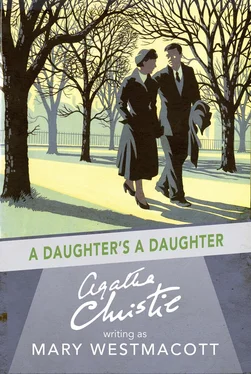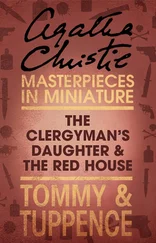For Sarah and her friends were always in a flux of coming and going and ringing up and changing plans. ‘Mother darling, can we have a meal early? We want to go to a movie.’ ‘Is that you, Mother? I rang up to say I shan’t be in to lunch after all.’
To Edith, that faithful retainer of over twenty years’ service, now doing three times the work she was once expected to undertake, such interruptions to normal life were very irritating.
Edith, in Sarah’s phrase, often turned sour.
Not that Sarah couldn’t get round Edith any time she liked. Edith might scold and grumble, but she adored Sarah.
It would be very quiet alone with Edith. Peaceful—but very quiet … A queer cold feeling made Ann give a little shiver … She thought: ‘Nothing but quietness now—’ Quietness stretching forward vaguely down the slopes of old age into death. Nothing, any more, to look forward to.
‘But what do I want?’ she asked herself. ‘I’ve had everything. Love and happiness with Patrick. A child. I’ve had all I wanted from life. Now—it’s over. Now Sarah will go on where I leave off. She will marry, have children. I shall be a grandmother.’
She smiled to herself. She would enjoy being a grandmother. She pictured handsome spirited children, Sarah’s children. Naughty little boys with Sarah’s unruly black hair, plump little girls. She would read to them—tell them stories …
She smiled at the prospect—but the cold feeling was still there. If only Patrick had lived. The old rebellious sorrow rose up. It was so long ago now—when Sarah was only three—so long ago that the loss and the agony were healed. She could think of Patrick gently, without a pang. The impetuous young husband that she had loved so much. So far away now—far away in the past.
But today rebellion rose up anew. If Patrick was still alive, Sarah would go from them—to Switzerland for winter sports, to a husband and a home in due course—and she and Patrick would be there together, older, quieter, but sharing life and its ups and downs together. She would not be alone …
Ann Prentice came out into the crowded life of the station yard. She thought to herself: ‘How sinister all those red buses look—drawn up in line like monsters waiting to be fed.’ They seemed fantastically to have a sentient life of their own—a life that was, perhaps, inimical to their maker, Man.
What a busy, noisy, crowded world it was, everyone coming and going, hurrying, rushing, talking, laughing, complaining, full of greetings and partings.
And suddenly, once again, she felt that cold pang—of aloneness.
She thought: ‘It’s time Sarah went away—I’m getting too dependent on her. I’m making her, perhaps, too dependent on me . I mustn’t do that. One mustn’t hold on to the young—stop them leading their own lives. That would be wicked—really wicked …’
She must efface herself, keep well in the background, encourage Sarah to make her own plans—her own friends.
And then she smiled, because there was really no need to encourage Sarah at all. Sarah had quantities of friends and was always making plans, rushing about here and there with the utmost confidence and enjoyment. She adored her mother, but treated her with a kindly patronage, as one excluded from all understanding and participation, owing to her advanced years.
How old to Sarah seemed the age of forty-one—whilst to Ann it was quite a struggle to call herself in her own mind middle-aged. Not that she attempted to keep time at bay. She used hardly any make-up, and her clothes still had the faintly countrified air of a young matron come to town—neat coats and skirts and a small string of real pearls.
Ann sighed. ‘I can’t think why I’m so silly,’ she said to herself aloud. ‘I suppose it’s just seeing Sarah off.’
What did the French say? Partir, c’est mourir un peu …
Yes, that was true … Sarah, swept away by that important puffing train, was, for the moment, dead to her mother. And ‘I to her,’ thought Ann. ‘A curious thing—distance. Separation in space …’
Sarah, living one life. She, Ann, living another … A life of her own.
Some faintly pleasurable sensation replaced the inner chill of which she had previously been conscious. She could choose now when she would get up, what she should do—she could plan her day. She could go to bed early with a meal on a tray—or go out to a theatre or a cinema. Or she could take a train into the country and wander about … walking through bare woods with the blue sky showing between the intricate sharp pattern of the branches …
Of course, actually she could do all these things at any time she liked. But when two people lived together, there was a tendency for one life to set the pattern. Ann had enjoyed a good deal, at second hand, Sarah’s vivid comings and goings.
No doubt about it, it was great fun being a mother. It was like having your own life over again—with a great deal of the agonies of youth left out. Since you knew now how little some things mattered, you could smile indulgently over the crises that arose.
‘But really, Mother,’ Sarah would say intensely, ‘it’s frightfully serious. You mustn’t smile. Nadia feels that the whole of her future is at stake!’
But at forty-one, one had learned that one’s whole future was very seldom at stake. Life was far more elastic and resilient than one had once chosen to think.
During her service with an ambulance during the war, Ann had realized for the first time how much the small things of life mattered. The small envies and jealousies, the small pleasures, the chafing of a collar, a chilblain inside a tight shoe—all these ranked as far more immediately important than the great fact that you might be killed at any moment. That should have been a solemn, an overwhelming thought, but actually one became used to it very quickly—and the small things asserted their sway—perhaps heightened in their insistence just because, in the background, was the idea of there being very little time. She had learnt something, too, of the curious inconsistencies of human nature, of how difficult it was to assess people as ‘good’ or ‘bad’ as she had been inclined to do in her days of youthful dogmatism. She had seen unbelievable courage spent in rescuing a victim—and then that same individual who had risked his life would stoop to some mean petty theft from the rescued individual he had just saved.
People, in fact, were not all of a piece.
Standing irresolutely on the kerb, the sharp hooting of a taxi recalled Ann from abstract speculations to more practical considerations. What should she do now, at this moment?
Getting Sarah off to Switzerland had been so far as her mind had looked that morning. That evening she was going out to dine with James Grant. Dear James, always so kind and thoughtful. ‘You’ll feel a bit flat with Sarah gone. Come out and have a little celebration.’ Really, it was very sweet of James. All very well for Sarah to laugh and call James ‘your pukka Sahib boy friend, darling’. James was a very dear person. Sometimes it might be a little difficult to keep one’s attention fixed when he was telling one of his very long and rambling stories, but he enjoyed telling them so much, and after all if one had known someone for twenty-five years, to listen kindly was the least one could do.
Ann glanced at her watch. She might go to the Army and Navy Stores. There were some kitchen things Edith had been wanting. This decision solved her immediate problem. But all the time that she was examining saucepans and asking prices (really fantastic now!) she was conscious of that queer cold panic at the back of her mind.
Finally, on an impulse, she went into a telephone box and dialled a number.
Читать дальше












